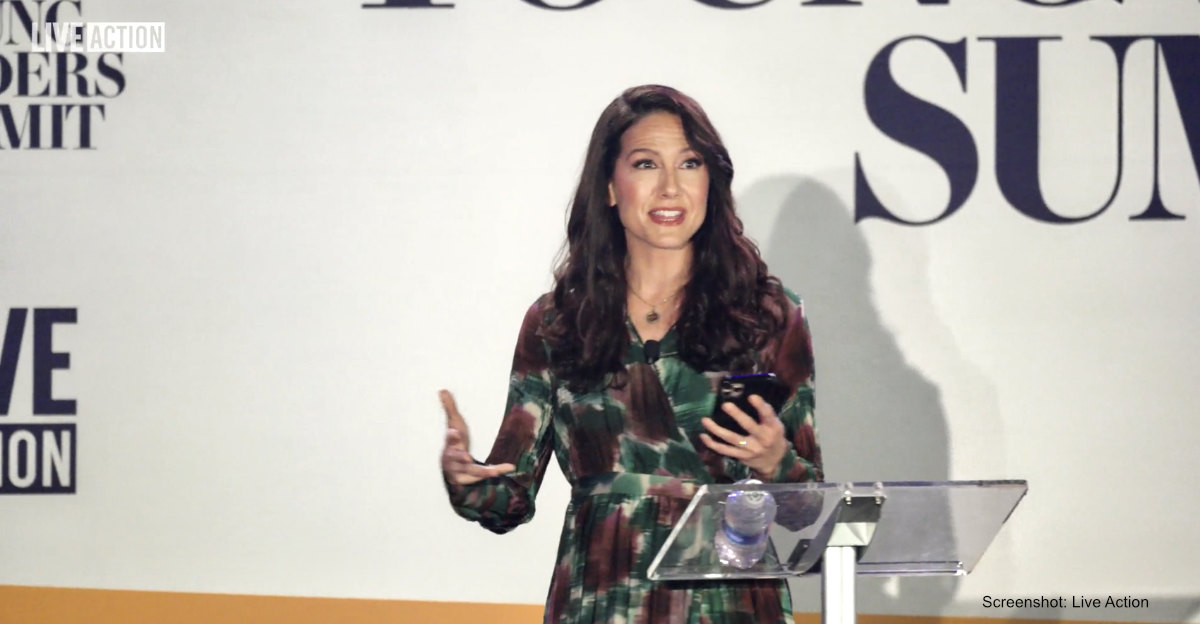Board-certified OB/GYN Dr. Lauren Rubal joined Live Action at its 2025 Young Leaders Summit on March 22, 2025, to discuss the timely and sensitive topic of in vitro fertilization (IVF) before an audience of 1,500.
Rubal discussed the issues surrounding the declining fertility rate, including the societal expectation to delay having children. Delaying childbearing means women have a “lower pool” of eggs when they are “ready” to have children, making it more difficult to get pregnant. Combined with a 50% drop in sperm count in men from Western countries over the last 40 years, it is becoming more difficult for couples to get pregnant. Rubal explained that five years ago, she told patients that one in eight couples would experience infertility — but now that number is one in six, and it’s pushing more people toward IVF.
“So what’s the issue, right?” she asked. “Isn’t IVF pro-life, as people argue, because it helps create more life?” She continued:
Is this the answer… to our population decline and in the face of impending doom? Absolutely not. Not scientifically, not medically, not morally, and not ethically.
How can I tell you this? Well, I’m objectively an expert in it. I did a three-year reproductive endocrinology and infertility fellowship after my four years of OB/GYN training. I practiced as an IVF doctor. I was involved with some of the very procedures that I’m about to discuss with you. I sat in front of patients and I grieved with them and I counseled them and I talked to them about infertility and about IVF and like the vast majority of my colleagues, truly thought I was doing a good thing because wanting to have children is a good and ordered desire.
But I was absolutely wrong on how to do it. I didn’t realize it at the time.
Rubal explained that doctors are trained that IVF is the best way to treat infertility, but she eventually realized that reproductive issues are symptoms of other health issues that need to be healed first.
“I also realized that I was playing God,” she said. “I was literally involved in life and death for at least thousands of embryos. These are unique, irreplaceable human beings who, I knew from my scientific training, were created at the moment of fertilization — the moment that egg is fertilized by sperm….”
Despite the pain of infertility, she said, “Children are not a right owed to people.”
In addition, Rubal said that “medically, IVF actually isn’t all that it’s presumed to be. I saw with my own eyes that nothing in infertility is 100%. The average live birth chance in the U.S. from a woman who undergoes an egg retrieval procedure is 37%.”
Over 30 years, she explained, there have been about 333,000 live births from IVF — but because seven to 11 embryos are made in each cycle, 6.5 million embryos have been created. This means, she explained, that just five percent (5%) of embryos created through IVF over three decades made it to birth. Ninety-five percent (95%) are destroyed, die during the process, or have been left frozen. Many will be biopsied and screened for health conditions and then intentionally destroyed when they fail to make the cut.
However, restorative reproductive medicine takes a different approach, explained Rubal.
“If there’s a fertility problem, there has to be an underlying reason. Identifying and hopefully correcting those underlying reasons will then resolve and restore reproductive health,” she said. “Put another way, restorative reproductive medicine is a scientific approach to cooperate and restore normal physiology and anatomy as opposed to methods that are going to circumvent or destroy or suppress it.”
Rubal encouraged the young people in attendance by offering practical steps to help with their own fertility. In addition to ditching hormonal birth control, Rubal encouraged attendees to limit processed foods, eat organic, and make sure your gut is working well. She advised men not to use steroids or take testosterone, and advised them to learn about their own reproductive cycles.








